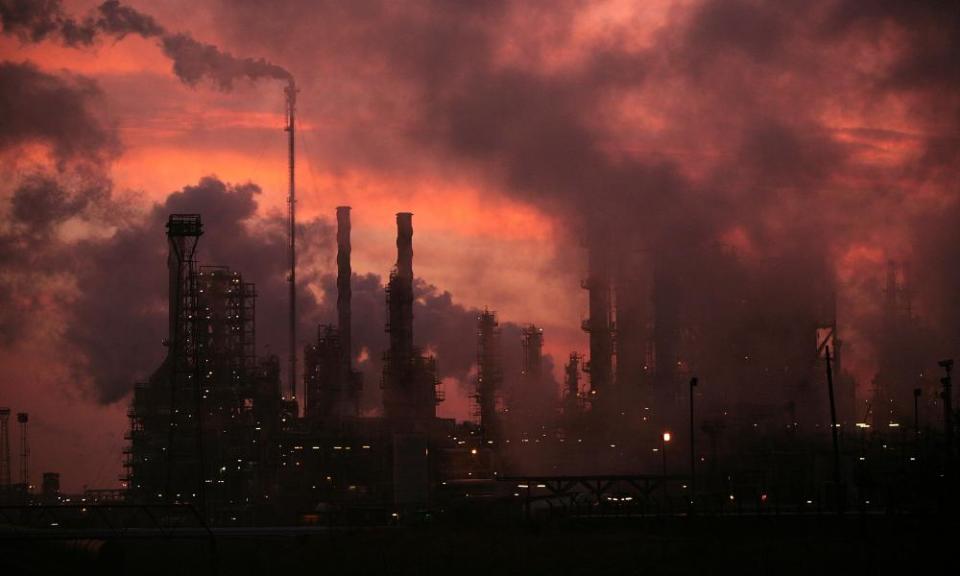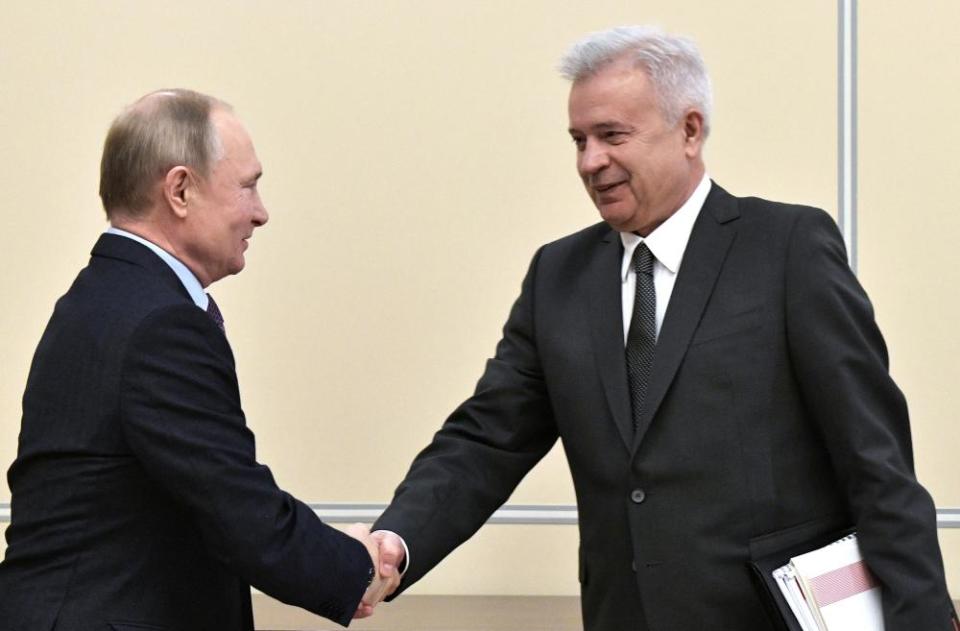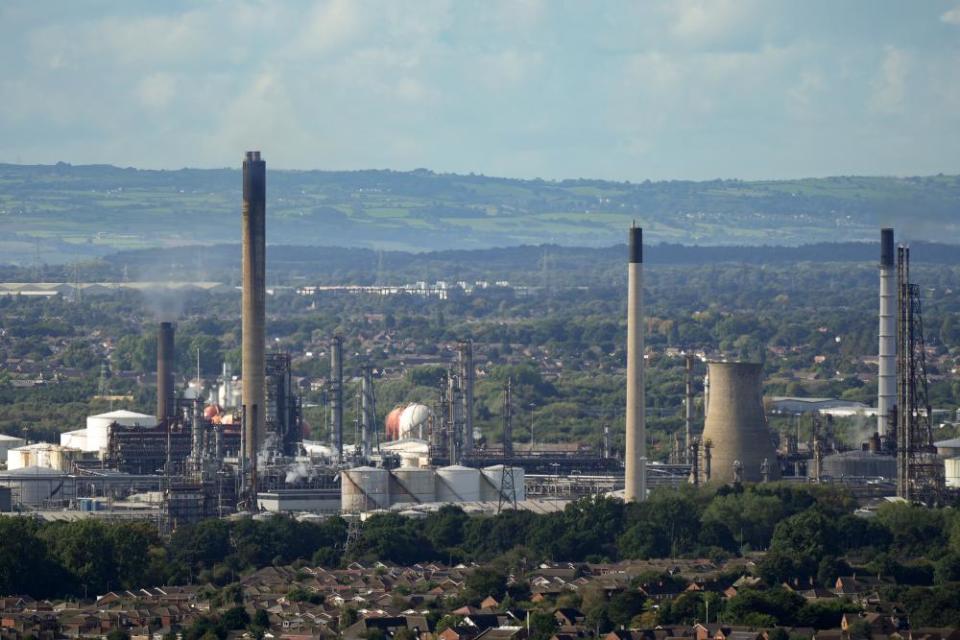Oil refinery woes raise concern in Westminster over financial backers

The panic-buying of petrol and diesel that gripped Britain in September served as an unwelcome reminder of how disruption to supplies can rapidly escalate into crisis. But while the long queues on forecourts have gradually receded, concerns persist about the finances of refineries supplying about 25% of fuel.
Financial difficulties afflicting two of the UK’s remaining oil refineries have raised concerns in government about their little-known ties to a Kremlin-allied oil business and a commodities trading house under investigation for corruption, the Guardian understands.
Prax Lindsey oil refinery in north Lincolnshire swung from a £1.9m profit to a £228m loss in the year to February 2021, hurt by the Covid pandemic crushing demand for fuel, accounts filed at Companies House show.
The punishing loss comes just weeks after Stanlow oil refinery in Ellesmere Port, south of the Mersey, was granted a temporary reprieve from the prospect of a winding up order from HM Revenue and Customs. HMRC gave a “time-to-pay” deal to Stanlow’s owners – the billionaire Ruia brothers behind India’s Essar conglomerate – allowing breathing space to stump up £223m in overdue VAT.
Essar Oil (UK), the company that houses Stanlow, lost $221m (£162m) in the year to the end of 30 September 2020.
The threadbare finances of those two refineries underline the vulnerability of Britain’s fuel supply, and how these crucial pillars of UK infrastructure are tied to obscure sources of funding. Of the national capacity of 60m tonnes of refined fuels per year, Stanlow can produce more than 16% and Lindsey about 9%.
Previously the refineries were owned by the oil firms Shell and Total, which needed an outlet for their product. Now both are in the hands of far less well-known players.
According to sources familiar with discussions in Westminster, Stanlow’s place in the financial architecture of Essar, an Indian conglomerate, was a factor in political reluctance to consider a bailout, had one been required.
Accounts for Essar Oil (UK) show it agreed to lend up to $375m to the Mauritius-based Essar Oil & Gas Limited in 2019 and was this year considering extending a further $400m loan.
Days after accounts detailing these loans were filed at Companies House, it was revealed that Deloitte had resigned as Essar’s auditor, citing a need for improved governance, “in particular regarding loans and advances”. The loans were made at the behest of Essar Oil (Cyprus), Stanlow’s parent company, accounts show. That Cypriot entity has also collected £500m in dividends from Stanlow since 2017.
The refinery’s apparent links to Russia have also raised political concerns, the Guardian understands. Companies House filings reveal that Essar Oil (UK) registered a charge – security for a loan – in favour of Litasco, a Switzerland-based oil trading division of the Moscow-based Lukoil.
Lukoil is a £50bn oil giant founded from the ashes of Soviet Russia by its president and chief executive, Vagit Alekperov, who owns more than 20% of the company and appears to be on convivial terms with Vladimir Putin.

In June, Essar Oil (UK) appointed Tim Bullock, a former chief executive of Litasco between 2012 and 2018, to its board as an independent non-executive director, which it said would strengthen governance. Essar said Bullock no longer had a role at Litasco and owns no shares in it.
According to the Companies House documents, Litasco has a claim on Stanlow assets that would kick in if the refinery were to default on its (undisclosed) obligations, meaning the assets could fall into the hands of the Lukoil subsidiary if the debt was defaulted on.
That claim is specifically over Stanlow Terminals Limited, a key part of the sprawling Stanlow complex, where crude oil from around the world is dropped off and stored before being refined.
One veteran of the refining industry said owning the storage facility could give Lukoil a “ransom strip”, a piece of land that can be used to turn the screw on anyone who needs access.
Essar Oil (UK) said: “Like all refiners, EOUK was heavily impacted by the pandemic. Despite this, we’ve strengthened our balance sheet through private financing, taken action to bolster governance, and are trading profitably again.
“Since Essar’s acquisition in 2011, $1bn has been invested in Stanlow to make it one of the most sophisticated refineries in north-west Europe. Overall, EOUK is successfully navigating through the pandemic and emerging robustly. We are confident about the strong demand recovery and our future prospects in an evolving low-carbon energy market.”
Essar says Lukoil and Litasco are separate corporate entities and that Litasco has no ability to influence operations at the Stanlow terminal.
In 2017 Essar sold its huge Vadinar oil refinery in Gujarat, India, to a consortium including the Russian state-controlled oil firm Rosneft and the commodities trading house Trafigura in a £10bn deal.
As of this year, Trafigura also has a significant interest in the Lindsey oil refinery in Lincolnshire. In March the French oil company Total sold the refinery to Prax, a unit of a little-known outfit headquartered in Surrey called State Oil, which has grown at meteoric pace, its revenues surging nearly tenfold between 2010 and 2020.
Its controlling party, Winston Soosaipillai, who goes by his middle names of Sanjeev Kumar, is rarely spotted in public or at industry events and has almost no public profile. The company said it was a “natural progression” to acquire the Lindsey refinery but did not answer more detailed questions.
In March 2021, the same month that the company bought Lindsey, it registered charges in favour of Trafigura, the global commodities trading house based in Singapore, part of a supply agreement.
If Prax were to default on payments due to Trafigura via that agreement, the charge documents say, the commodities trader is entitled to seize control of contracts to supply fuel to BP, Asda and Certas Energy.

In May 2020 the Guardian revealed that Trafigura was under investigation by authorities including the US Department of Justice, which is looking into suspected corruption and market manipulation. Trafigura declined to comment at the time.
Officials in Westminster are understood to have become uncomfortably aware of Prax’s ties to Trafigura in recent months, particularly in light of the US investigation.
Keeping tabs on who owns the UK’s six big refineries, not to mention the identity of their creditors, is all the more important as the sector creaks under soaring oil prices and volatile demand.
The pandemic has been “pretty ugly”, according to Alan Gelder, a refining and chemicals expert at energy consultancy Wood Mackenzie. “[Financial failure at Stanlow] was a very real risk a couple of months ago, which is when the situation was looking particularly dire,” he said.
Refineries need to run close to capacity to make money but their output fell by 19% last year amid the pandemic. Longer term, extinction is on the cards, with the government banning new petrol and diesel cars by 2035.
Refineries that survive, says Stone, will be those with deep-pocketed owners, such as ExxonMobil’s Fawley near Southampton and Pembroke in Wales, owned by the US firm Valero.
As one industry veteran put: “We’re on a route map to two or three refineries, it can’t be any different. Either we’re not going to decarbonise or we are. And if we do, we’re going to close refineries.”

 Yahoo Finance
Yahoo Finance 